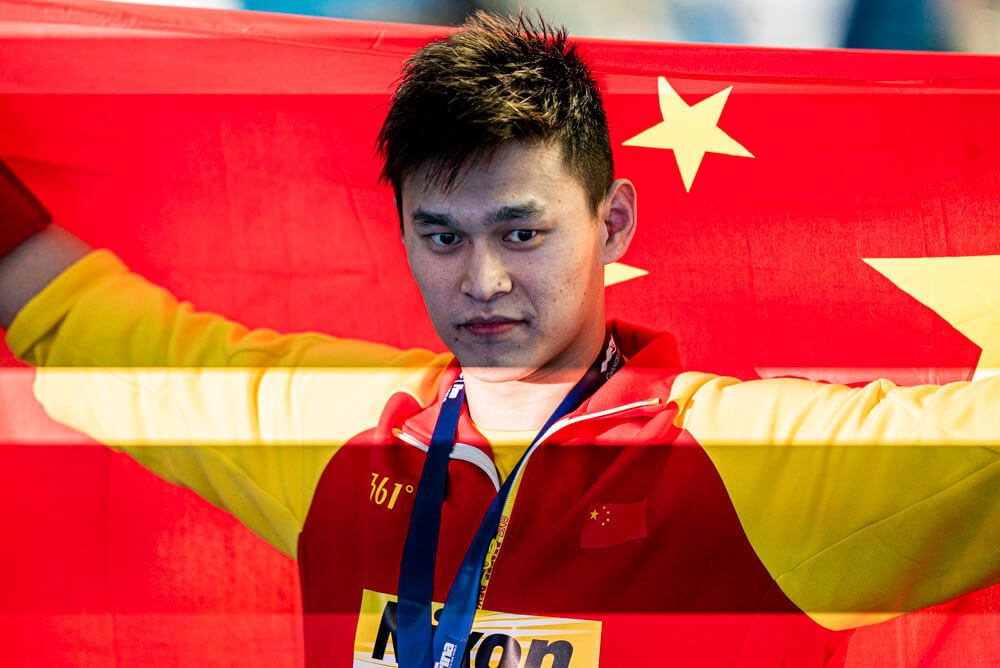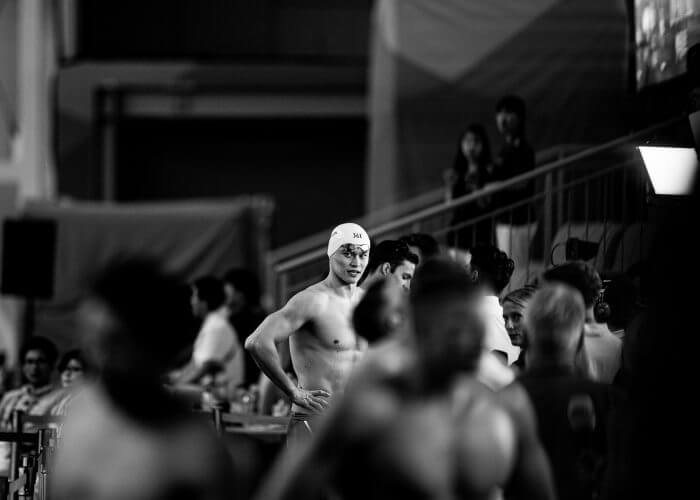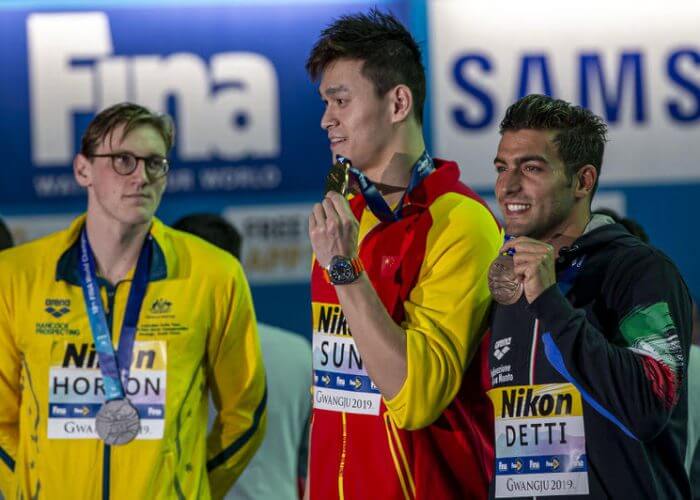Sun Yang’s Court of Arbitration Hearing To Be Heard November 15, Says Chinese Lawyer

Sun Yang CAS Anti-Doping Hearing
Sun Yang’s Court of Arbitration (CAS) hearing will be held in Lausanne on November 15, the swimmer’s Chinese lawyer Zhang Qihuai has announced.
CAS has yet to add the hearing date to its published list of official hearings, its last statement confirming that a hearing was unlikely before the end of October given that all parties had not yet agreed to a timetable of events.
The hearing, requested by the World Anti-Doping Agency (WADA) is into a FINA Doping Panel decision to impose no penalty on Sun Yang, the 2012 Olympic 400 and 1500m freestyle champion for China who in 2014 was served a doping penalty, after an acrimonious encounter with anti-doping testers in September 2018.
Sun Yang was issued with a series of harsh rebukes, including a warning that he had put his entire career at risk. However, the Doping Panel said the case hung on the interpretation of whether the word “documentation” was singular or plural. FINA lawyers suggested that it was plural when it came to what identification and qualification papers needed to be submitted by anti-doping agents on an out-of-competition test visit.
In English language, the word documentation can be interpreted as singular or plural, while WADA is expected to argue that the paperwork submitted by agents from the IDTM anti-doping testing agency working on behalf of FINA on the evening in question last year was adequate.
That view is at least in part backed up by the FINA Doping Panel itself when
The Sun Yang CAS hearing will be the first of its kind to be held in public since the Michelle Smith appeal of 1998. The Irish swimmer lost her appeal, her suspension for tampering with a sample was confirmed and she retired from the sport.
CAS pencilled in a tentative date for a hearing in September but the date was never confirmed nor published. All parties to the case must agree to the timing of the hearing, while one party to a case with three sides – Sun and his lawyers and entourage; FINA; and the World Anti-Doping Agency (WADA) – has requested further time to prepare their case.
In its last statement on the case, CAS stated:
“At the parties’ request, the hearing, which will likely take place in Switzerland, will be open to the public (including the media). Full details of the arrangements for those who wish to attend the hearing will be made available once the new hearing date and location have been officially confirmed. This will be the second time in the history of CAS that a hearing is held in public. The first public hearing, which took place in 1999, was also related to the sport of swimming, in the matter Michelle Smith De Bruin v. FINA.”
Smith de Bruin, of Ireland, lost her case, was banned from the sport and never returned. Her triple-gold result at the Atlanta 1996 Olympic Games is not a matter of official celebration in Ireland, the national performance centre for swimming, which would have been named after Smith had she not fallen from grace, among venues void of any commemoration of her.
The Sun Yang case

Sun Yang – Photo Courtesy: Becca Wyant
In January, the FINA Doping Panel issued Sun with a series of stern rebukes in the report of a hearing into an acrimonious visit to the swimmer’s home by an out-of-competition testing team last September.
The visit ended at around 3.15am after more than four hours of arguments between Sun and his entourage on one side and the testing team from the IDTM agency in Sweden hired by FINA on the other. By the time the arguing was done, no urine sample had been provided and the blood sample that Sun had submitted to had been smashed with a hammer, to the “hour” of the chief testing officer, by a security guard, watched over by Sun, his mother, Ming Yang, and his doctor, Ba Zhen, who in 2014 and 2015 was served two suspensions by WADA for his role in Sun’s positive test for a banned substance in 2014.
After the Sunday Times broke the story in January, WADA made further inquiries into the case and decided in early March to challenge the FINA Doping Panel decision at the CAS.
In January this year, the FINA Doping Panel, in its 59-page hearing report, noted that significant mistakes were made by both swimmer and entourage and the anti-doping testers. The team of Chinese testers working for IDTM, the Swedish testing agency hired by Fina, included a main officer, a blood nurse (both women), and a man there to observe Sun urinate. They may have presented inadequate documentation to prove their authority, identification and qualification for the tasks each of them were assigned.
Sun objected to the identification papers and behaviour of the man there to observe him provide a urine sample. Sun’s doctor, Ba Zhen, arrived half way through four hours of argument and procedure, and objected to the qualification of the nurse present to take blood on the basis of the qualification she would have needed in certain circumstances in a Chinese hospital. IDTM and FINA argued that her qualifications were adequate for the task at hand.
The biggest mistake of the testers was not to make clear to Sun Yang that they would register a “failure of comply” — and then follow through by doing just that, the FINA Doping Panel concluded. Sun, meanwhile, received a caution. The panel felt “compelled to point out its very significant concerns regarding the conduct of the athlete and his entourage. Avoiding an anti-doping rule violation . . . was a close-run thing” that could have “ended his athletic career”, the Doping Panel concluded.

Mack Horton, left, keeps his distance to Sun Yang for the photo-op with bronze medallist Gabriele Detti after medals in the 400m free at world titles in Gwangju – Photo Courtesy: Patrick B. Kraemer
In its “Caution to the Athlete” the Doping Panel noted that it “rejected many of the Athlete’s contentions and positions as being unfounded and invalid.
“The Athlete and his entourage were not correct regarding many aspects of the sample collection session. That should be a sobering lesson to the Athlete. The following are but examples:
- “Signing the Declaration prepared by Dr. Ba was not evidence that the sample collection personnel agreed with its substantive contents. In contrast, it was a form of Report that any athlete may submit at the conclusion of a sample collection session (see ISTI Article 7.4.4). DCOs are instructed to sign any and all such athlete provided comments. Others may sign as a witness. ISTI Article 7.4.6 references the need to have the DCO sign the documentation to confirm that the comments provided by an athlete (or Dr. Ba) reflect the athlete’s concerns – not to confirm that the DCO is in agreement with them.
- “The time of the testing mission (commencing at about 11 p.m.) was perfectly appropriate. That it continued so long into the night was unfortunate, but no ground to fault the conduct of IDTM or FINA. This was at the very end of the “60-minute” time period specifically identified by the Athlete when he would be available to be tested. Indeed, the Athlete narrowly avoided a potential Missed Test allegation as he arrived just as the 60-minute time period was ending.
- “The Athlete’s entourage continually asserted that the IDTM DCA should have presented to the Athlete DCO accreditation and related authorizations. This is absolutely not required – despite testimony that in China it is standard for all individuals who attend at a sample collection session to be trained as DCOs. In the ISTI, and for all tests performed by other Sample Collection Authorities while in China, it is perfectly proper for DCAs or Chaperones to perform their limited roles and tasks with no DCO accreditation. This so-called “higher standard” claimed by the Athlete’s witnesses is not required in the ISTI, and is absolutely not a justification to refuse to accept the credentials of an otherwise properly authorized DCA, who is not a DCO.
- “The events in 2017 involving the Athlete and the DCO (when she was in training to be a certified ITDM Doping Control Officer) did not give rise to a conflict of interest so as to disqualify the DCO from acting in her role at the sample collection session on September 4, 2018. Complaints were made and comments were written at the conclusion of the session in 2017, but in no way did that disqualify the DCO from continuing to test the Athlete, now or into the future. Likewise, the Athlete’s testing history and the latest negative test result were not relevant to the issues before this Doping Panel.”
The panel said that Sun should have followed protocol, provided samples “under protest” and register his objections on the doping control form.
The testing session last year ended with no urine being supplied and a vial of Sun’s blood being smashed with a hammer by a security guard under instruction from the swimmer’s mother, according to testimony provided to the FINA Doping Panel in its hearing report. Neither the blood nurse nor the man hired to observe Sun providing a urine sample attended the hearing.
Sun Yang and entourage requested the CAS hearing be held in public. The swimmer argues that his protestations on the evening in question were legitimate and he claims he was standing up for athletes’ rights when he insisted on procedure being followed to the letter of the rule. WADA begs to differ, while some athletes feel Sun worked against their best interests by falling foul of anti-doping rules in 2014 and then by his behaviour since.
The delay in dealing with Sun’s case led to podium protests at the World Championships in Gwangju in July. FINA warnings were issued to Sun, Mack Horton and Duncan Scott in Gwangju.




#cheater
Will he be allowed to bring a hammer with him?
Say adios big guy and good riddance.
No matter which way it ends it’s good for all of us.
He gets acquitted and the haters get free BMC material for years to come or he gets convicted and we get a precedent to use against the next one.
ASADA should be ashamed of themselves the fact that they should have put a ban on him immediately and stopped him from swimming at the world championships